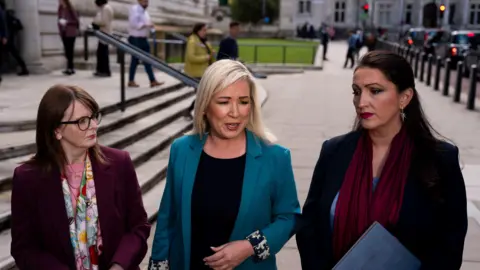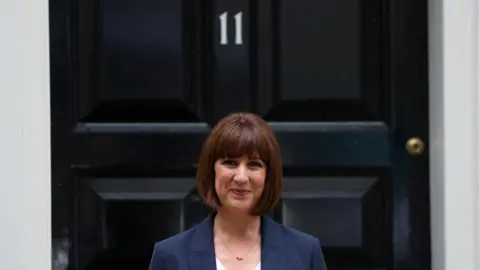Ministers meet UK chancellor to discuss budget
 BBC
BBCNorthern Ireland's first and deputy first ministers have met with the Chancellor, Rachel Reeves, to discuss Stormont's budget.
The Finance Minister, Caoimhe Archibald, who also attended the meeting, described it as "useful" and said ministers stressed the need to "prioritise investment in public services".
Deputy First Minster Emma Little-Pengelly told BBC News NI that the delegation would stress the need for sufficient funding "to run adequate public services".
First Minister Michelle O'Neill said, "Labour needs to change tack," adding that the executive was "here for what's right and what's fair".
'No begging bowl'
"The Labour government should not be trying to balance the books on the backs of pensioners, on the backs of hard-working people," Little-Pengelly said.
The deputy first minister also insisted that the delegation was "not going to the government with a begging bowl".
Instead, she said ministers would be asking the chancellor to "step up and support us" in their efforts to reform and improve Northern Ireland's public services.
"We’re going with plans, we’re going with proposals in terms of the sustainability of our budget; in terms of looking at sensible decisions – the things that we need to do in Northern Ireland," she explained.
"But of course in order to have that transformation you need to invest. You need to be able to give us what is required to run adequate public services."
Archibald said that NI ministers recognised the challenge that the Labour government faced, adding that it was an "inherited mess" from the previous Conservative government.
"We impressed upon the chancellor the need to use the upcoming budget to prioritise investment in public services and public sector workers," she said.
She added that they had stressed the need to "have a different approach than what we have seen in the last 14 years under the conservatives".
"The executive is committed to putting our finances on a stable footing but the most important thing from our perspective is that we see investment in public services and that we get our fair share of that" Archibald added.
On Monday, the Northern Ireland Executive's draft programme for government (PfG) was published.
The 88-page document, entitled Our Plan: Doing What Matters Most, sets out the executive's ambitions under several core areas.
It outlines nine "immediate priorities" the executive intends to work on this year and for the duration of its electoral mandate.
When asked on Monday how the priorities would be funded, First Minister Michelle O'Neill told BBC News NI that Northern Ireland's funding model is not right.
"That needs to change, so we'll be at the Treasury's door again on Thursday to continue our engagement around the funding model here," she added.
 Reuters
ReutersOn Tuesday, the finance minister told assembly members (MLAs) that Stormont departments are currently facing spending pressures of £767m.
That means departments believe they need £767m more than what is currently in the budget.
Caoimhe Archibald said Stormont can expect to get about £500m extra, partially as a consequence of October’s Westminster budget.
She said while that will go a "significant way" towards easing the pressures, ministers will have to play their part and there would only be "full certainty" of the amount towards the end of this year.
Archibald also warned that if ministers did not operate within budget it would have "grave consequences" for future public funding.
The finance minister said the Treasury has been "explicit" that any overspend this year would trigger the suspended repayment of a previous £559m overspend.
"We must face up to the challenges, strive to live within our budgets and avoid a scenario in 2025-26 of having to deal with paying back any overspend from this year along with a further £559m from previous years, by taking the responsible decisions that we need to achieve financial balance this year," she told the Assembly.
